Total Recall Ending: Was It A Dream The Whole Time?
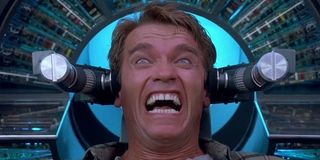
The 1990s Total Recall is one of the great action movies of Arnold Schwarzenegger's career. However, it's also one of the smarter movies that the actor was ever involved in. To this day, it's not clear to many people exactly how the movie ended. Was Douglas Quaid actually a secret agent who had false memories of his life implanted? Or is most of what we see throughout the film just the playing out of the false memory that was implanted?
Total Recall was based on a Philip K. Dick story entitled We Can Remember it for You Wholesale and as such it has some fairly mind-bending aspects to it. The film takes significant liberties with the story of course, it is a film adaptation after all, but what the movie ends up doing is asking a question the original story never does. Can we trust the events we're seeing on screen? Are the events of the film the "real" story or are they just the fake memory that the main character paid for? Let's see if we can answer:
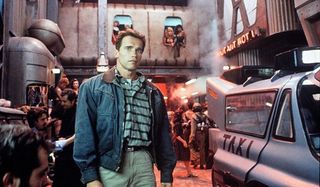
The Plot
Before we can get into the specifics of what the film gives us regarding the reality of the situation, we need to start with a basic rundown of the film's story. Arnold Schwartzenegger plays Douglas Quaid. The year is 2084 and Quaid is a fairly ordinary guy, with, one assumes, an ordinary job, breaking rocks with a jackhammer. It's really not clear what he does beyond that. The guy does have one thing going for him, which is that his wife looks like Sharon Stone.
Doug's wife suggests they go on vacation and Doug is really obsessed with visiting Mars. His wife, for some reason, is really not interested in Mars. This causes tension between the two, and Quaid eventually decides that if he can't go to Mars, he'll have a memory of going there implanted in his brain. A company called Rekall sells fake memories as a way for people to take vacations without having to spend as much money or worry about things going wrong. However, in addition to simply getting a standard memory, he also decides to add an option which would make him a secret agent during his memory.
It's at this point that things get weird. In the middle of the implantation procedure, Quaid starts to go nuts. You see, apparently, Douglas Quaid is actually a secret agent, and in trying to implant this vacation memory, the Rekall techs inadvertently uncovered the fact that the life he's living now is actually false. Quaid has his memory wiped, but upon returning home, both Doug's best friend and wife try to murder him. Apparently "Douglas Quaid" has only existed for a few weeks and his entire life was a setup in order to keep Carl Hauser, his real name, under wraps. Hauser used to work for the guy who runs Mars, Vilos Cohaagen (Ronny Cox) and Hauser learned things he shouldn't know, but now that those memories are coming out, Quaid needs to "get your ass to Mars" and finish the job.
Upon arriving on Mars, Quaid meets several people who know Hauser, and they work together to figure out what Cohaagen is hiding. As it turns out, Cohaagen is hiding an alien artifact that would make the Martian atmosphere breathable. Quaid and his friends successfully activate the artifact and the movie ends with a free Mars. However, it also ends with a question. Was any of this real or was it all an implanted memory?
Now that we have the basics laid out, let's look at each of the key moments and try to figure out the answer to this question.
CINEMABLEND NEWSLETTER
Your Daily Blend of Entertainment News
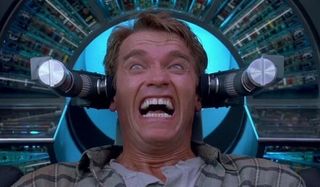
The Ego Trip
The key moment in Total Recall is the Ego Trip. That's the name that the Rekall company gives to the memory option that allows Douglas Quaid to believe he was a secret agent. It's at this moment that the movie either shifts from "reality" to "dream state," or that Quaid's true memories come out. The movie says fairly clearly that Quaid's outburst, and his claims that his "cover" is being blown, cannot be the result of the Ego Trip, because they had not implanted it yet. However, the truth is that by this point we're already past the point of no return. Quaid has already gone under for the procedure which means we can't necessarily take this statement as fact.
In addition, the technicians begin to show Doug some Martian artifacts in order to get him acclimated to the things he will experience in his memory. They also ask him about the sort of woman he wants to meet, as that's part of the package. Everything that we see here, which takes place prior to Quaid going under, comes back later in the movie. The alien artifact that creates the breathable atmosphere looks exactly like what Quaid looked at in a monitor back at Rekall. Even the girl's face that he sees looks just like the one he eventually runs into, and has a previous relationship with, on Mars.
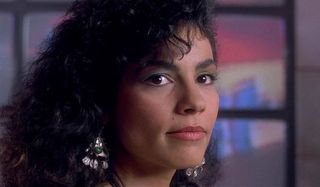
The Dreams/The Girl
One of the arguments that the movie makes that the events of Total Recall actually happen is based around the character of Melina, played by Rachel Ticotin. The movie opens with Doug Quaid having a dream about himself and a brunette woman, walking together on the surface of Mars. When we meet Melina, Quaid's contact on Mars, it turns out that she looks exactly like the woman from his dreams. It would certainly make sense if Quaid's memories were real, that the reason he was dreaming about this woman is that his actual memories were influencing his subconscious, and causing him to dream about her.
While that argument works as far as it goes, the problem is it also works in the other direction. If everything on Mars is a dream, then it would make sense for him to insert the woman from his own Mars dream into the implanted Mars dream. Exactly where he came up with this image isn't known. He claims to not recognize her. Maybe he saw her on the bus. It doesn't actually matter.
The other place that we see Melina is in the monitors at Rekall as they're prepping him for his implant. The fact that the woman from his existing dream shows up here doesn't make ANY sense, regardless of which argument you want to believe. However, as Quaid is already falling asleep at this point, it's possible that we're looking at an image already modified by his subconscious.
The Music
Not every indication of what's reality and what is not is visual. Some of it comes from the music. There is a particular musical cue that is used in the film specifically to indicate the Rekall organization. It can be heard at the very end of the film's credits before the fanfare finale (the 7:47 mark). The same music cue is used in the movie at a couple of key points. The first is when Douglas Quaid first visits the Rekall facility.
It's not heard again until a point on Mars where a man shows up at Quaid's hotel room telling him that he's a doctor from Rekall. We see the same man earlier in the film doing commercials for the company. The doctor tells Quaid that Quaid had some sort of break from reality, and the company cannot wake him up from the memory implant. Therefore, they've added the doctor to the memory to try and talk him out. When that doesn't work, they bring Sharon Stone back as his wife to try and talk him out, claiming that any memory he has of her trying to kill him was just part of the implant. The digital music cue hits as soon as Arnold Schwarzenegger opens the door and sees Stone. The movie is trying to tell us that Rekall is reaching out and trying to end the fantasy.
The fact that the same music is heard at the end of the movie when the credits are over is also indicative of the fact that the memory (the movie) is now over and it's time to wake up.
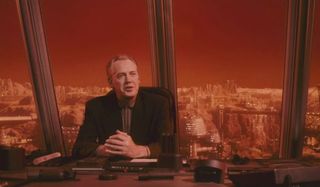
The Non-Schwarzenegger Moments
If there's a major part of the film that is not fully explained by the "it's a dream" argument, it's the fact that some scenes in the movie take place without our main character. There aren't many scenes in the film that Arnold Schwarzenegger is not in, but there are a few. This would seem to support the idea that what we're watching is actually happening. The audience is being shown what other characters are up to while our hero is dealing with other things. Certainly, these moments are not part of Douglas Quaid's memory implant, there's no reason that his memory would include anything he didn't witness. From the standpoint of an implanted memory, nothing he didn't witness ever actually happened.
The only real argument that can be made here is that these scenes were needed simply to make the movie work. We needed to see what the bad guys were doing in order for them to be complete characters. Still, one could argue that these moments can only exist if the story is actually happening.
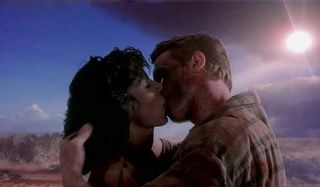
The Blue Sky
In the end, however, there is one overwhelming argument for the idea that Total Recall is almost entirely a dream. When Doug Quaid is getting prepped for his implant, one of the technicians makes a remark about the memory including something a little odd.
That's a new one, blue sky on Mars.
It's an easy enough line to miss because it's the other tech in the foreground who is working directly with Arnold Schwarzenegger's character. You're not really supposed to hear the comment. However, lo and behold, when the movie ends a blue sky on Mars is exactly what we end up with. To believe this is a coincidence is pure lunacy. The information about the alien tech that creates the blue sky isn't public knowledge, so there's no reason for Rekall to include it. The only way that the movie can end with a blue sky is if it's a dream. The blue sky thing was created by Rekall, the fact that we see one means that Quaid is still inside his own head.
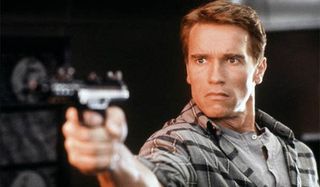
Conclusion? It Was A Dream
In the end, there's simply too much evidence, too much coincidence that one would need to accept in order to believe that Total Recall is anything other than a memory implant. The blue sky on the planet Mars is too much of a coincidence. The argument that Melina must be real because he dreamed of her prior to the implant is too easily explained away. There's nothing that needs to be explained if you look at it from the dream perspective, and too much that doesn't make sense if you try to argue it was reality. It doesn't make Total Recall any less of a great film. It's still fiction either way, of course. However, if you watch it again with all this in mind it may change the way you see the entire story.

CinemaBlend’s resident theme park junkie and amateur Disney historian, Dirk began writing for CinemaBlend as a freelancer in 2015 before joining the site full-time in 2018. He has previously held positions as a Staff Writer and Games Editor, but has more recently transformed his true passion into his job as the head of the site's Theme Park section. He has previously done freelance work for various gaming and technology sites. Prior to starting his second career as a writer he worked for 12 years in sales for various companies within the consumer electronics industry. He has a degree in political science from the University of California, Davis. Is an armchair Imagineer, Epcot Stan, Future Club 33 Member.
Most Popular






